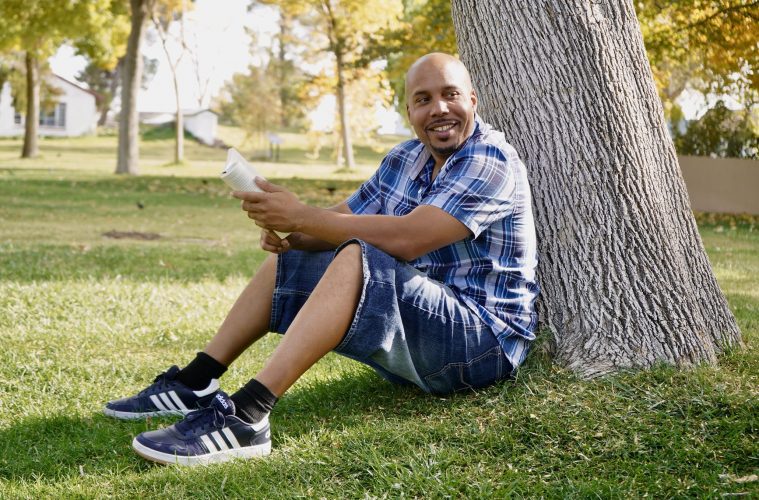Self-Care starts with the Self. But what does that mean? Detroit Native, Robert Allen, explores the concept of true self-care in his new book, “Self Care: Let’s Start the Conversation.”
Allen specializes in mental healthcare, with a background in education, psychology, consulting, and even ministry. Allen’s conversation teaches us that self-help shouldn’t be a lonely journey, but an ongoing collaboration that needs to be happening in all of our various circles. Whether at home or in the workplace, we can change our mindsets by creating discussions surrounding topics such as stress, habits, and coping mechanisms. By normalizing this discourse, it becomes natural to think about and implement.
For the up and coming generations of kids becoming young adults, Allen believes that beginning to talk about self care will better enable them to assert independence and maneuver themselves through life’s challenges. Recently, Allen took his college-bound, aspiring astrophysicist son on a trip to Michigan’s Upper Peninsula with a small camper.
“He graduated with a 4.1 GPA,” Allen said. “I told him, I can’t help you with your homework, but I want to teach you something that I was never taught, and that’s ‘how to say no’ and ‘how to care for you’.”
Surrounded by the lush landscape that Michigan offers, Allen and his son took the opportunity to chat about what was going on in each other’s lives. With the help of Allen’s book, they would read a chapter together and share what issues they encounter regarding the topic, creating a safe space to start the conversation. Within this dialogue, they brainstormed ways to decompress and set boundaries for themselves to put themselves first before they can be their best self for others. With conversations like these, kids, parents, teachers, or other teammates in one’s life can begin to form a mutually beneficial network of support.
Consider the example of teachers. It is essential that this sector is educated in wellness. These days, our educators need to balance the mandates of testing, the stress of managing a full classroom, then caring for their own household and families at the end of the day. Robert pointed out that teachers are going home to their own kids who end up with the short end of the stick because they get the mere leftover energy of the Teacher/Parent.
It’s a familiar story. This is why Robert focuses on the importance of being educated in wellness and suggests starting with accessible tools, such as what he refers to as the 4 R’s.
Retreat – remove yourself from all distractions. Whether it be your familial or job responsibilities, carve out time to be alone and away from interruptions to hear your own thoughts and feelings.
Reflect – reflect on what works well in your life? Strive to understand you. Where can you conserve more energy? Are there things that are unnecessarily draining you that you can eliminate?
Replenish – What fills your cup? Invest in those things, places, and people that pour into you, rather than drain you.
Restore – Now that you’ve completed the process, you are ready to move forward in a new light. Change yourself into something more beneficial for you.
As one progresses through these Rs, Allen encourages conversations to take place along the way with a trusted buddy, to ensure accountability and consistency.
It is certainly not only teachers who feel the weight of their responsibilities leaving them depleted before the day is done. That’s why the idea of self-care as a priority is becoming increasingly popular in corporate settings and other workplaces. With Allen’s New Dimension Consulting Services, he and his team specialize in creating bespoke retreats for organizations. No matter the sector, attendees of Allen’s retreats found the allotted time to decompress and learn about new approaches to self-care. These ideas have brought much happiness to Robert’s own life. I asked Robert about his favorite failure that he overcame using his principles of self-care:
“My favorite failure that I overcame was the need to be all things to all people. I failed at it because I can’t, it’s impossible,” Allen said. “I have 4 or 5 degrees. When I looked back, I didn’t even want to do all of those degrees, but it was ingrained in me that this is what you do to be successful. I didn’t even have fun doing all of them, nor did I want them all. But I did it to please other people.”
Robert has moved forward, however, and has learned to appreciate those things in life that he finds most valuable.
“Now one of my mottos is to ‘Actually, Live Life’; love the experiences, take the time to look around, and really embrace whatever it is you’re going for and that you’re passionate about, instead of just checking boxes.
Get Robert’s book, Self-Care: Starting the Conversation here.
- Instagram: @rwallenbooks and @ndcssolutions
 Lim-Lim Kobe is curious about the passions of others. She adventures around the world exploring the realms of art, hospitality, and wellness.
Lim-Lim Kobe is curious about the passions of others. She adventures around the world exploring the realms of art, hospitality, and wellness.

